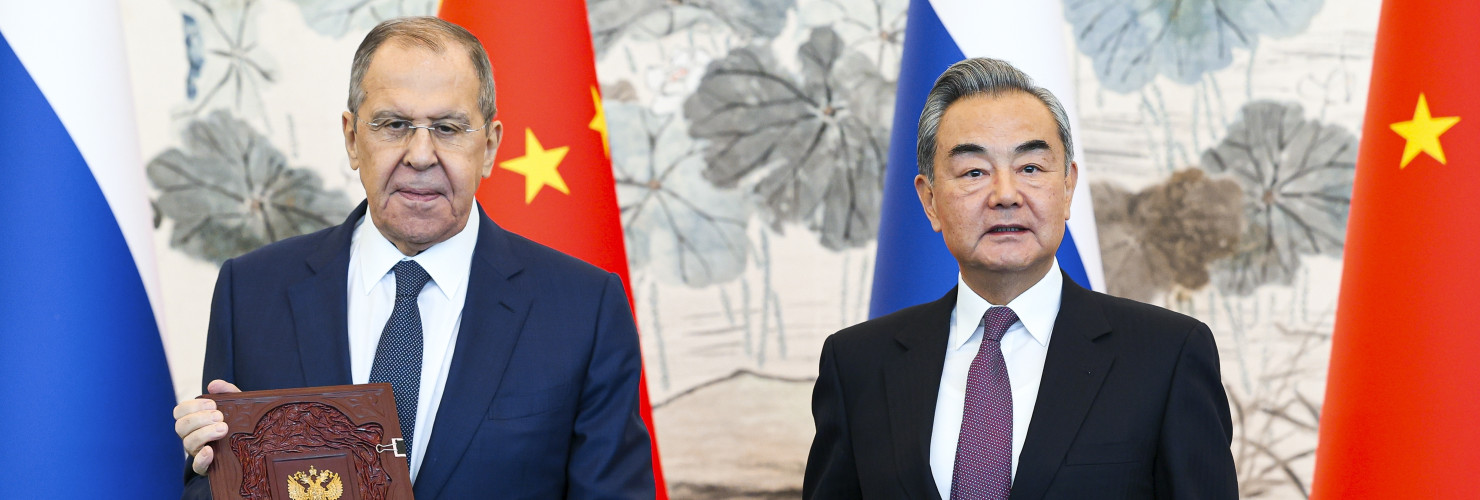

MERICS China Security and Risk Tracker 01/2024
Chinese Forcasts for 2024: Beijing doubles down on its geopolitical ambitions
2024 is set to be a challenging year for China. Russia’s war in Ukraine and the conflict in the Middle East will complicate its relations with liberal democracies. China’s economic downturn and the socioeconomic consequences will demand difficult adjustments. And upcoming elections in Europe and in the United States will inject uncertainty and instability into China’s international environment.
Despite all this, China’s leaders seem optimistic about the country’s international position and the outlook for its geopolitical ambitions. Preparing for the 75th anniversary of the founding of the People’s Republic, Beijing seems satisfied with its foreign policy approach and sees no reason to change course.
At the December 2023 Central Foreign Affairs Work Conference, President Xi Jinping noted the world has entered a “new period of turbulence and transformation” in which “major-country diplomacy with Chinese characteristics will enter a new stage where much more can be accomplished”.1 The government’s work report to the National People’s Congress (NPC) in March had a similar tone, outlining Beijing’s grand ambitions to reform the global governance system.2
For Western analysts and forecasters, the key China-related risks facing the world this year include China’s sputtering growth model, its close ties with Russia and its response to the upcoming US elections.
Chinese think tanks and analysts see China’s key risks differently.
For a fuller picture of the year ahead, this briefing will look at risk forecasts for 2024 from three Chinese organizations – 1) the Center for International Security and Strategy (CISS) at Tsinghua University;3 2) the Center for National Security Research at Renmin University;4 and 3) the China Institutes of Contemporary International Relations (CICIR)5. Their analyses are essential to understand what China’s top foreign policy thinkers expect, and to contextualize leaders’ statements about their agenda and priorities in the year ahead.
Washington is seen as the top risk
The 2024 US elections in November feature among China’s top security risks in all these forecasts. Chinese analysts expect to see a tougher line on China from the Republican and Democratic parties during the campaign. They worry it will undermine what Beijing calls the “San Francisco Vision”, referring to a pathway to stabilize relations which Beijing says Xi Jinping and US President Joe Biden agreed at their November 2023 summit. It is questionable whether such a consensus exists as the US side has not mentioned this vision.
Chinese experts expect the negative impact of election rhetoric to spread beyond bilateral relations. But they have contradictory views about the impact on China’s international environment. Some forecasts fear the United States will become more reluctant to get actively involved in issues of global concern in 2024, leading to more global instability. Others zero in on what they see as Washington’s very proactive role in other risks and crises that China faces, from the worsening conflict with the Philippines in the South China Sea, to rising tensions in the Korean Peninsula.
Artificial Intelligence (AI) is a new addition to the list of upcoming risks. Here too, the US is central to China’s concerns. Washington is accused of using its AI dominance to preserve its global hegemony. Examples include US restrictions on tech exports to China that are intended to curb China’s technological development.
Few Chinese forecasts delve into what might happen after election day. However, CISS dedicates a few lines to a Donald Trump victory. Recalling the 2016 phone call between Trump and then-Taiwanese President Tsai Ing-wen, it warns that any more such calls would harm the situation in the Taiwan Strait.
US-China geopolitical competition remains top of mind for Chinese analysts, who see Washington as the main driver behind many of the challenges China is facing today.
The EU’s de-risking agenda has become a top concern
Chinese experts share a negative view of the global economy this year. However, they identify Western countries’ policy choices as the source of the major risks to China. They pinpoint the problem as the politicization and securitization of economic and commercial ties. This, they say, is driven by the shared desire of the United States, European nations and others to preserve their competitive advantage at the expense of a global economic recovery.
For this reason, Europe features – unusually – among of China’s top risks this year. The EU’s de-risking strategy is portrayed as an excuse to pursue discriminatory trade practices against China and for Brussels to politicize commercial relations. Some forecasts worry that Europe will make further progress towards de-risking this year, regardless of any pause caused by elections to the European Parliament. Their key issues of concern include new anti-dumping investigations (on top of the current EU investigation into Chinese EVs), an agreement to set up an outbound investment-screening mechanism, or a potential critical raw materials partnership with likeminded partners to compete with China.
Chinese forecasts see China as being better placed than most countries to weather the global economic situation, a view that contrasts with Western analyses. China’s economic upturn is likely to continue, they say, despite the difficulties caused by Western policies.
Global conflicts are expected to escalate
The ongoing war in Ukraine and the conflict in the Middle East are top priorities for most European policymakers this year. Chinese analysts share this assessment. They warn of a growing risk that war in Ukraine may spill over into a wider confrontation between Russia and NATO, though not necessarily a war. They also express concerns that the “situation” will continue to affect regional stability and China’s chances for cooperation with Europe. However, none of the forecasts openly criticize Russia’s actions or question Beijing’s partnership with Moscow. All remain in line with official policy priorities. For the same reason, most reports use the word “situation” rather than “war” to describe the Ukraine conflict.
Chinese experts are also concerned that the conflict in Gaza may escalate this year. Attacks by the Houthis and other groups against Israeli and US targets are thought likely to accelerate Washington and Tel Aviv’s drive to strengthen regional military deterrence. The impact of an escalating conflict on trade routes and energy markets at a time of economic difficulties is seen as posing a severe risk to China’s interests in the Middle East.
The way forward: China’s priorities in 2024
The forecasts examined here also outline Beijing’s way forward in 2024. Chinese experts expect US-China relations to worsen in the run-up to the November 2024 elections: they advocate for preserving stability, for continued engagement with the Global South and for the promotion of Xi Jinping’s new global initiatives to achieve China’s strategic objectives.
These views echo Beijing’s official 2024 foreign policy priorities, as expressed at the Central Foreign Affairs Work Conference;6 in foreign minister Wang Yi’s review of his ministry’s work;7 and at the March 2024 National People’s Congress.8
The policy areas and issues to watch this year are:
- Stability in US-China relations: Beijing will try to keep relations stable in the run-up to the November 2024 elections and prevent tensions from escalating. But competition will remain the main logic of action.
- Continued support for Russia: China-Russia relations will remain strong. Beijing has committed to deepening its cooperation with Moscow, even as the war in Ukraine enters its third year.
- Attempts to derail the de-risking agenda: Creating obstacles to the EU’s de-risking agenda will be a priority for Beijing, as it is seen as a key risk to China’s economic and technological ambitions. Europe should expect a diplomatic charm offensive in member states to reduce support for the Commission’s work on de-risking.
- Outreach to developing countries: Beijing will continue to focus on deepening ties with developing nations. It will leverage its Global Development, Security and Civilization Initiatives (GDI, GSI and GCI) alongside the revamped Belt and Road Initiative (BRI) to build a network of countries to support its ambitions for global governance reform. China-friendly multilateral formats like BRICS or the Shanghai Cooperation Organization (SCO) will be prioritized and reinforced.
Chinese leaders are not blind to the challenges facing the country and the difficult international environment ahead. However, the party’s top echelons seem confident in the party-state’s international work and ability to weather geopolitical storms.
Top China Risks 2024
The likelihood or probable impact of some of the top China risks for 2024 has shifted since MERICS assessed them at the end of 2023. The likely impact of the US elections and lack of cohesion among EU member states in an election year remains high and largely unchanged. Other risks have become more urgent, as suggested by recent events – such as announcements at the annual meeting of the National People’s Congress (NPC) and Li Hui’s trip to Europe. Below, we outline some key developments that have shifted our assessment of these risks.
The risk of China’s economic trajectory undermining Europe’s industrial base continues to grow. European Commission President Ursula von der Leyen called on Xi Jinping to rebalance the EU-China trade relationship at the December 2023 EU-China Summit, urging him to tackle unfair competition practices that are impacting European industry. But these calls seem to have fallen on deaf ears.
The recently concluded NPC – the annual meeting of China’s legislature – confirmed that Beijing will continue to drive resources into manufacturing to boost growth. The government’s work report promised to improve domestic consumption, but the lack of a clear plan to get there makes any such increase in demand unlikely. Without rising consumption, boosting manufacturing will only create even greater overcapacity.
Beijing’s ambitious 2024 economic targets also make any consolidation within industries that have existing overcapacity a difficult proposition. Industrial reforms that might impact jobs or overall economic growth would be at odds with the leadership’s baseline targets of 5 percent growth, 12 new million new urban jobs and cutting urban unemployment rates to 5.5 percent.9
Europe therefore needs to prepare itself for a rapid increase in cheap Chinese exports to the EU. Chinese exports will squeeze European industry and could trigger further measures from the European Commission, potentially unleashing a broader trade conflict with Beijing. The Chinese leadership knows this but is prioritizing economic growth and domestic security.
Beijing has yet to deploy most of the regulatory and legal tools it has built up in recent years to exert control over tech supply chains. China’s leadership has given a muted response to the European Commission’s anti-subsidy investigation into Chinese EVs, launching a probe into imports of European brandy. Beijing has also imposed export restrictions on some graphite products. But this could change as US and European restrictions and investigations pile up, targeting sectors that Beijing sees as critical for its own economic growth and bringing implications for European industry.
Actions against China’s EV industry in both the EU and the US may trigger a response from Beijing. Retroactive tariffs appear a likely outcome of the European Commission’s investigation into Chinese EVs, despite opposition from European car manufacturers. Across the Atlantic, the Biden administration has ordered an investigation into Chinese technology embedded in China-made EVs, due to data security concerns.10 It is reportedly also considering other restrictions on imports of Chinese smart cars.
EVs are not the only sector being targeted. Washington is reportedly pressuring allies and partners, from the Netherlands to Germany, to further restrict exports of semiconductor technology to China. This is likely to be a sticking point at the G7 Summit in June because of the impact it would have on European companies.
It is by no means certain that Beijing will retaliate against any of these measures. But its growing focus on technology’s potential to become China’s main growth driver raises the stakes. International actions targeting Beijing’s tech capabilities or its “new three” sectors (EVs, batteries and solar panels) may well be seen as threats to China’s economic security that warrant a far tougher response.
Beijing shows no signs of changing course on its support for Moscow as the war in Ukraine enters its third year. The risk that China-Russia coordination will expand is higher, while the likelihood of China playing a constructive role to find a solution to the conflict is lower.
Between January and February, two Chinese vice-foreign ministers had meetings in Moscow, and Xi Jinping, Wang Yi and new Defense Minister Dong Jun spoke to their counterparts on the phone. Such frequent contact highlights the closeness of the diplomatic relationship. This was only confirmed during a March trip to Europe by Li Hui, China’s Special Representative for Eurasian Affairs. Li started his trip in Moscow, before visiting several European capitals, including Brussels, Berlin and Kyiv.
Li’s trip was meant to remind European nations that there is a Chinese plan to find a political end to the war in Ukraine (and to portray the West as fueling the conflict). Instead, it showed Europeans how much Beijing is standing by Russia. Li reportedly echoed Russia’s language and positions in most of his meetings, with little or no new talking points besides a series of complaints about the EU’s sanctions against Chinese firms.
China continues to support Russia economically and technologically. In 2023, the China-Russia trade volume reached a record high of USD 240 billion, up from around USD 190 billion in 2022.11 Ukrainian sources have reported finding growing numbers of China-made components in Russian weapons on the battlefield.
Li Hui’s trip was designed to appease the EU's concerns about China's role in supporting Russia’s war against Ukraine, while strengthening its image as a global peacemaker in the eyes of Global South nations. Arguably, it failed in the first of these objectives, but Beijing will keep trying to reduce pressure for it to condemn Russia. The upcoming Swiss-hosted peace talks will provide it with another opportunity. However, Beijing’s actions will continue to bring tense relations with Europe, heightening the risk of more sanctions and hence an expanded trade conflict.
The first quarter of 2024 has brought changes to China’s regulatory environment that will affect actors with a presence there. This section analyzes some of the key pieces of legislation that international actors should take into consideration.
State Council Organic Law
This revised law, approved at the NPC, further strengthens the party’s steering power over government affairs. It provides legal consolidation for the central decision-making role of CCP top-level commissions and leading small groups. It also enables far more flexible reorganizations of China’s cabinet to serve policy agendas set by the party. This can now be done by a decree of the NPC or its Standing Committee, doing away with lengthy legal revisions.
State Secrets Law
Just before the NPC, its Standing Committee revised the 2010 State Secrets Law. Referencing Xi Jinping’s broad national security concept, the law stipulates that the CCP leads state efforts to guard secrets. It requires new internal processes in all public institutions to vet information, especially what can be published online, and requires nationwide education campaigns. It also introduces “work secrets” as a new category of restricted information, which will be specified in additional regulations. This is bound to incentivize government agencies and businesses to decrease information sharing, especially with international counterparts.
Hong Kong Article 23 legislation
Hong Kong’s opposition-free legislative organ passed the new “Safeguarding National Security Ordinance” on April 19, after a record-fast process. The law aligns Hong Kong legislation with mainland law in one big sweep, by baking in the CCP’s broad understanding of national security, state secrets, espionage and “collusion with foreign forces”. This will likely impact transparency and information sharing in Hong Kong and may spur political overreactions to individual or corporate behavior. The law claims extraterritorial applicability for many offenses, and especially entities with a registered presence in Hong Kong could be prosecuted for perceived infractions.
Private Sector Promotion Law
The NPC announced it will commence work on a new law to support the private sector, although the timeline remains unclear. The law is meant to protect the property rights of private enterprises, ensure fair market access and timely payments by public institutions. The envisioned content largely repeats goals and strategies announced in various private sector promotion plans in 2023, which have failed to restore the sector’s confidence.
Looking forward: What to watch in the months ahead
- Early May: Xi Jinping is expected to travel to France this spring to celebrate the 60th anniversary of France-China relations. This trip will come soon after German Chancellor Olaf Scholz’s own visit to China in mid-April. China’s leaders will use these visits to talk up opportunities for cooperation between Europe and China and seek to derail the bloc’s de-risking agenda.
- 20 May: Taiwan’s President-elect Lai Ching-te will be inaugurated, four months after winning the January presidential elections. Beijing will watch the tone and content of his inauguration speech and first engagements with foreign officials, and may take escalatory action (while keeping below the threshold of conflict).
- 1 June: the Indo-Pacific’s leading defense summit, the IISS-organized Shangri-La Dialogue, will take place in Singapore in June. It could be the first public appearance at an international forum for Dong Jun, China’s new defense minister. Dong was appointed in late December 2023 to replace Li Shangfu after the latter’s unexplained removal from office. He has still not been made a member of the Central Military Commission.
- 6-9 June: all EU member states will go to the polls to elect the new European Parliament. The results of these elections will determine who takes the helm of the European Commission for the next five years, and thus also the future direction of the EU’s China policy and de-risking strategy.
- 9 July: NATO allies are already preparing for the alliance’s next summit, to be held in Washington. While Russia and the war in Ukraine will remain at the top of the agenda, China and NATO’s relationships with its Indo-Pacific partners will also play a key role. With elections in the US looming, agreement on concrete deliverables is likely to prove even more complicated than at previous summits.
- Entnotes
-
1 https://www.fmprc.gov.cn/eng/zxxx_662805/202312/t20231228_11214416.html
2 https://english.www.gov.cn/news/202403/12/content_WS65f06025c6d0868f4e8e506c.html
3 https://ciss.tsinghua.edu.cn/info/qb/6933
4 http://www.huanqiucaijing.cn/372187.html
5 http://www.cicir.ac.cn/NEW/Reports.html?id=464f966c-17e8-475c-9627-3ebe51dea8e6
6 https://www.fmprc.gov.cn/eng/zxxx_662805/202312/t20231228_11214416.html
7 https://www.fmprc.gov.cn/wjbzhd/202401/t20240109_11220573.shtml
8 https://www.mfa.gov.cn/web/wjdt_674879/gjldrhd_674881/202403/t20240307_11255225.shtml
9 https://english.www.gov.cn/news/202403/12/content_WS65f06025c6d0868f4e8e506c.html
10 https://www.whitehouse.gov/briefing-room/statements-releases/2024/02/29/statement-from-president-biden-on-addressing-national-security-risks-to-the-u-s-auto-industry/
11 https://www.mfa.gov.cn/eng/zxxx_662805/202403/t20240308_11256414.html




